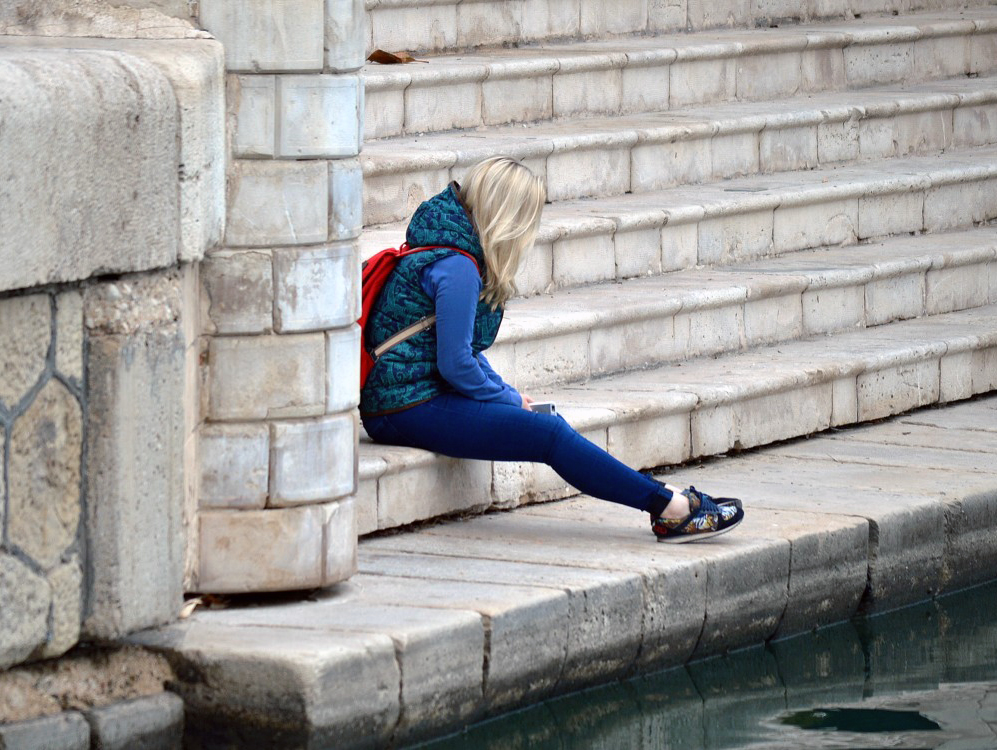Bring to mind a habit that you’d like to change. One that you often do unconsciously, without choice. It could be drinking, overeating, checking Facebook, or how you treat someone you love.
Really visualize yourself doing it. Imagine the sights, smells, tastes, and sounds.
How do you feel, right now, about this image of yourself pouring another glass of wine, or whatever it’s doing?
Odds are you’re feeling judgment, looking down on yourself.
It’s intuitive to think that being hard on yourself will help you stop a certain behavior. But self-judgment actually helps lock us into our habitual patterns.
I’m not talking rational thinking after the fact, like I need to stop drinking so much to be a better father. That’s very likely true. I’m talking about in the moment when we start following the habit.
Pouring another glass of wine or scrolling through Facebook is how we distract ourselves from an emotion we don’t want to feel, whether it’s restlessness, fear, loneliness, or anger. Self-judgment is a story that we add on top — it further distracts us from being present, open, and fully alive.
To break the cycle, what we really need is self-compassion. American Buddhist teacher Pema Chödrön calls it “unconditional acceptance of ourselves.” Once we stop being so hard on ourselves, we can start to implement strategies and tactics to change the habit we don’t like.
First, we need mindfulness, which gives us those rare openings to notice our self-judgment.
During a recent meditation retreat I learned just how fidgety and restless I can get when I can’t work on something or read or drive somewhere.
One of the great things about meditation retreats is that they take away all the ways you usually distract yourself.
Most of us spend our days jumping from one thing to the next, from breakfast to work to vegging out watching Netflix. We even fill the spaces in between — standing in line, sitting on the toilet, etc. — with email or Instagram or talking on the phone.
Retreat is no phone, no work, no books, no talking — nothing but meditation, sleep, and three meals a day.
This gives you the rare opportunity to observe rather than ignore what’s going on inside. What do you do with nowhere to be and nothing to do? What does your mind do when you’re bored? Who are you when you’re not a 3rd grade teacher or an app designer or a mother? Who are you when making money isn’t a priority?
The first morning on retreat, I sat in the kitchen downing cup after cup of coffee. I’m a caffeine addict, for sure, but I usually have one cup in the morning. Three cups in and my restlessness had morphed into anxiety with a piercing headache.
The next morning after my usual one cup, I decided to stay put and watch the restlessness. I felt a sort-of tunnel vision set in. My breath shortened. My shoulders and jaw tensed up. My mind thought, “A cup of coffee would be nice.”
Then there was a split second of self-judgment. I never would’ve seen it if I hadn’t slowed down to watch. A voice inside of me was talking as though I were someone else: there he goes again. He shouldn’t want more coffee. Look at him. He’s weak!
Self-judgment usually comes as a thought that includes the words should or shouldn’t, which exposes why it’s so toxic: we’re telling ourselves we’re not good enough. And when we don’t feel good enough, we lose self-esteem, becoming more prone to reacting out of habit rather than responding out of choice.
After about ten seconds, the voice faded and the urge fell away. My body relaxed and I began to think about whether I should use the bathroom before the next meditation period.
I’m still addicted to coffee, but this little “win” has given me the confidence to start to dial back my daily intake. Who knows what I’ll be able to take on next?
Ready to get serious about meditation?
Sign up for my weekly email on how to be mindful about the stuff that matters most — work, relationships, and, especially, politics.
Listen to the podcast version
I talked about this post on my podcast, Meditation for the 99%. Listen to it on Apple Podcasts, Google Play, and everywhere podcasts are available. Stream this episode below.
Podcast: Play in new window | Download
Subscribe: Apple Podcasts | RSS | More
